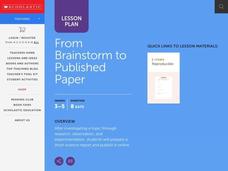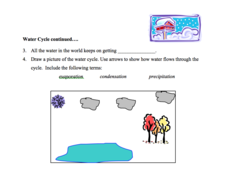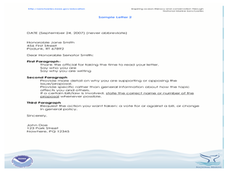Curated OER
Brainstorming the Environment
In this environmental science worksheet, students view a web of ideas on the environment and complete the web by filling in their own topics, such as air pollution.
Curated OER
Brainstorming and Creating a Graphic Organizer Using Kidspiration
Although focused on the winter ecology at Crater Lake, this lesson could be tweaked to use as a exploration of any region. After a visit to Crater Lake, learners discuss topics relating to winter in this area, such as the behavior of...
American Chemical Society
Hosting a Chemistry Debate
A debate is a forum for discussing controversial topics and environmental chemistry definitely fits that category. The lesson provides everything necessary to run a mini debate tournament. Use the suggested topics or come up with some as...
ReadWriteThink
Persuasive Essay: Environmental Issues
Young environmentalists learn how to craft a persuasive essay about an environmental issue they consider important. After studying the components of a persuasive essay and examining a student model, writers brainstorm possible topics and...
Curated OER
From Brainstorm to Published Paper
Students investigate a topic through research, observation, and experimentation. They prepare a short science report and publish it online. Students reflect on the role of science reports in the larger scientific community.
ReadWriteThink
Concept Map
When you think of one topic, related ideas and details invariably follow. That's concept mapping! Jot down ideas with a straightforward graphic organizer that works both electronically and as a printed resource.
Curated OER
Changing Seasons
Explore expository writing and using precise language in this descriptive paragraph writing lesson. Learners brainstorm prior knowledge about the changing seasons in Ohio. They describe seasonal items, view seasonal pictures from...
Chicago Botanic Garden
Causes and Effects of Climate Change
Wrap-up a unit on global climate change with a lesson that examines the causes and effects of climate change. Learners fill out a chart that represents what they think causes climate change—natural and human-based—and what they think...
National Science Teaching Association
Why Do We All Have to Stay Home?
Learners, especially young ones, might be confused about why or frustrated that we have to stay at home. Help answer questions and calm emotions with a nine-page resource that details topics regarding the COVID-19 pandemic.
Curated OER
Topic: Science Fair Project
Young scholars brainstorm ideas for science fair projects. Students observe a PowerPoint presentation and explore the scientific method. In groups, they formulate a hypothesis. Using the internet, young scholars research their topic...
Curated OER
Cloning Around
Review concepts of cloning and genetic engineering and participate in a round-table discussion based on the ethics and potential of cloning with your class. Each learner then writes a formal essay on the topic, stemming from the debate.
Curated OER
Water, Water Everywhere!
Learners brainstorm on ways they use water, and where water comes from. They view video, Down the Drain, to gain specific facts about water use, properties of water, problems of water and the water cycle. They perform a lab activity...
Safe Drinking Water Foundation
Water Pollution
An introductory lesson plan to a unit on water pollution, young environmentalists are asked to brainstorm examples of pollutants in water. This lesson plan will help develop a sense of what water pollution is and where the pollutants...
Curated OER
The Open Ocean, What is it and How Does it Change?
Students investigate the ocean environment. In this ocean lesson, students discover the physical properties of the ocean. Over two days, students work in small groups investigating ocean maps and creating water currents.
California Academy of Science
Poetic Reflections
Poetry is a wonderful way to explore language, express topical understanding, and incite creative thinking. After a trip to the local natural history museum (or zoo), learners write an acrostic or a cinquain poem describing one of their...
California Academy of Science
Climate Change Impacts
Getting kids thinking about climate change now, will hopefully push them into action when they become adults. Young environmentalists discuss the evidence and causes of climate change seen in the state of California. They brainstorm ways...
Curated OER
In My Opinion
Young writers craft letters to the government stating their opinion on different topics. They pick an environmental or ocean issue, research it, and craft their formal persuasive letter. Ensure your learners include supporting facts and...
Curated OER
Whale Song Acrostic
What do whales sing about? Invite your class to imagine the thoughts of whales before writing acrostic poems on the topic. The plan blends together a bit of life science with plenty of opportunities for creativity and writing.
Curated OER
Chemistry Day With Glitter Wands
First graders observe examples of the three states of matter and identify matter in each of the three states. They make glitter wands to remind them of the three states of matter: solid, liquid and gas. Pupils brainstorm and record...
Curated OER
Aquaculture: Down on the Salmon Farm
Students examine the problems of the continued development of aquaculture. They also brainstorm ideas that people in this field would need to be successful.
Curated OER
Renewable vs. Non-Renewable Resources
Fifth graders are introduced to the important topic of renewable, and non-renewable, resources. They are expected to be able to correctly categorize different types of resources as renewable or non-renewable. Another emphasis of this...
Science Friday
Termite Symbiosis
What happens to the wood a termite eats? Pupils learn about the three types of symbiosis with pictures of symbiotic pairs. Afterward, they determine whether there is a symbiotic relationship with a termite by dissecting termites and...
Berkshire Museum
Adopt a Schoolyard Tree
Help young scientists connect with nature and learn about trees with a fun life science lesson plan. Heading out into the school yard, children choose a tree to adopt, taking measurements, writing descriptions, and drawing sketches of it...
Smarter Balanced
Food Waste and Food Access
Forty percent of food in the US goes uneaten while 14.5 percent of US households lack a secure supply of food. As part of the preparation for a performance task assessment, groups consider statistics such as these about food waste and...























